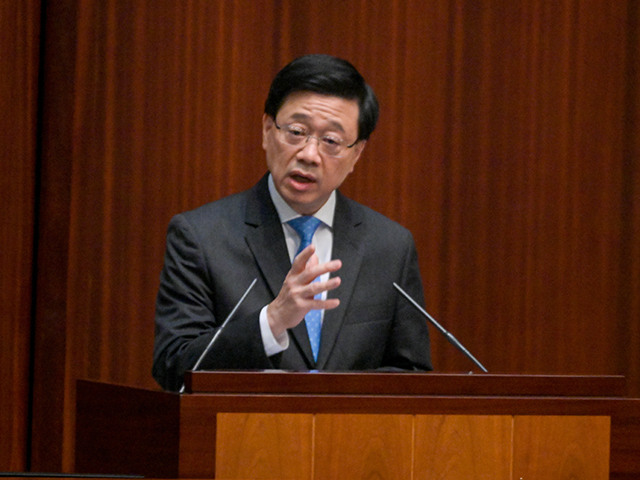Hong Kong chief executive John Lee, the hardline pro-Beijing former security chief who took over from the reviled Carrie Lam in July, devoted much of his three-hour maiden policy address on Wednesday to swooning over the Chinese Communist Party’s crackdown on democracy.
Lee also brainstormed ways for Hong Kong to replace the highly skilled professionals who have fled.
Lee was “elected” to succeed Lam in May, but not in a process that any free nation would recognize as an election. The public has absolutely no say in who runs Hong Kong – that was one of the famed “five points” raised by the massive 2019 pro-democracy demonstrations.
Instead, Hong Kong’s chief executive is effectively selected by Chinese Communist Party leaders in Beijing, who ensure the “election committee” in Hong Kong is stuffed with hardcore loyalists. Hong Kongers used to get to vote for their legislators, but even that meager ration of democracy was taken away from them last year when Beijing imposed new requirements that only certified Communist “patriots” can stand for election.
Lee was therefore able to get “elected” as chief executive even though he had a mere 34 percent approval rating in public opinion polls and was under sanctions from the United States for his role in the brutal anti-democracy crackdown, as were three members of his cabinet. Lee was also a driving force behind the effort to revise Hong Kong’s extradition laws in 2019, a bid to extend Beijing’s power that launched the protest movement.
Lee vowed on Wednesday to continue cracking down on dissent. Human rights groups around the world, and the United Nations, have called for the repeal of the 2020 “national security law” that effectively criminalized dissent, but Lee pledged to double down by introducing even more “anti-subversion” laws.
The UK Guardian noted Lee’s anti-subversion proposal would add seven more “crimes” to the four broad activities criminalized by the national security law, including “treason, theft of state secrets, foreign political groups conducting political activities in the city, and local bodies establishing ties with foreign counterparts.”
The Guardian counted no less than 50 mentions of the word “security” in Lee’s policy address, which was “clearly more ideologically driven” than any comparable speech delivered by his predecessors, in the estimation of Baptist University of Hong Kong political scientist Kenneth Chan.
Lee called for requiring public school teachers to become certified in the nuances of the draconian national security law, so they can teach it to their students. He said the government will implement “Rule of Law Education” programs to ensure “consistent and correct messages on the rule of law in the community.”
Lee’s authoritarian agenda also included a ban on the crowdfunding that has supported pro-democracy activities in the past, and increasingly tight censorship to shut down “disinformation.”
China’s state-run Global Times approvingly noted Lee spent much of his lengthy address praising the regime in Beijing and dictator Xi Jinping, while promising further “collaboration and integration with the motherland”:
In a nearly three-hour address at the Legislative Council in Hong Kong, Lee first said that amid the COVID-19 outbreak and a worsening global economic outlook, Hong Kong has been seeing growing challenges, however, under One Country, Two Systems, there are more opportunities as the city has the unique advantage of being backed by the country and connecting the world. National key strategic plans such as the 14th Five-Year Plan (2021-25), the Greater Bay Area (GBA) construction and the Belt and Road Initiative all provide opportunities to Hong Kong, he said.
[…] Lee said President Xi Jinping’s earlier visit to the Hong Kong Special Administrative Region (HKSAR) and his speech there were the blueprint for his policy address. He noted that the city is now at the critical stage of transitioning from chaos to order and prosperity and he will lead the governing team to work on the city’s growth plan.
The Chinese Communist Party’s Hong Kong and Macao Affairs Office rewarded Lee’s loyalty by praising his address as “a vivid reflection of the historic convergence of a new stage for Hong Kong’s development and a new journey of national development, showing that Hong Kong will surely achieve greater and better development in working together with the country.”
“We believe that the new HKSAR government will faithfully fulfill its pledges, constantly improve its governance system, improve governance capacity and enhance governance efficiency to create a better life for the people of Hong Kong,” the office said.
Not even the Global Times could gloss over Lee’s admission that the annihilation of Hong Kong’s autonomy and freedoms prompted an exodus of talent from the island, with some 140,000 members of the workforce fleeing overseas since the national security law was imposed.
Lee said his administration would “proactively trawl the world for talents” to address this brain drain, announcing a two-year no-strings visa for high-salaried employees and top university graduates, plus $30 billion co-investment fund for “attracting enterprises to set up operations in Hong Kong.”
Lee also announced a special rebate for people relocating to Hong Kong when they purchase homes and a $10 billion fund for university research teams whose work has the potential to found new tech companies.

COMMENTS
Please let us know if you're having issues with commenting.